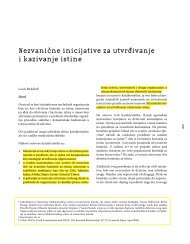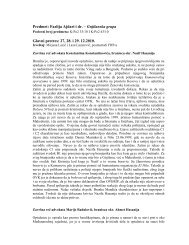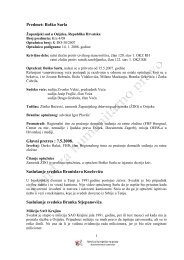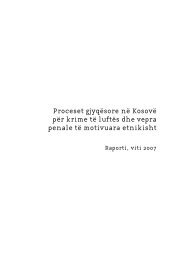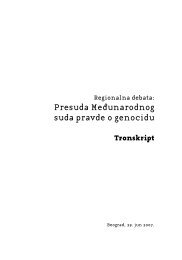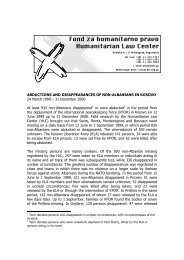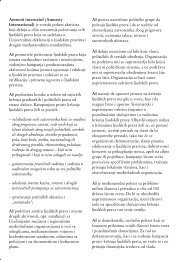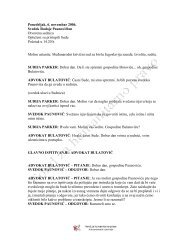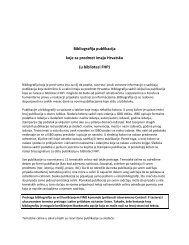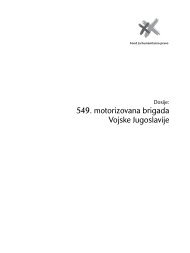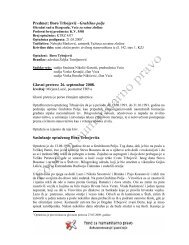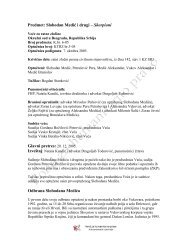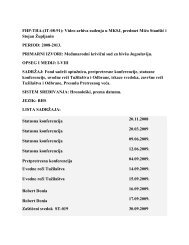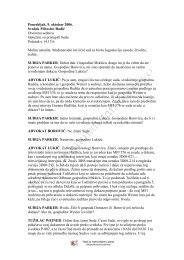here - Humanitarian Law Center/Fond za humanitarno pravo
here - Humanitarian Law Center/Fond za humanitarno pravo
here - Humanitarian Law Center/Fond za humanitarno pravo
You also want an ePaper? Increase the reach of your titles
YUMPU automatically turns print PDFs into web optimized ePapers that Google loves.
long. Testifying before the Higher Court in Belgrade in 2010, Medunić said he did not remember<br />
who exactly had hit him on the soles and who had sat on him, adding that he had not suffered as a<br />
result of it. The defense further argued that even if the court accepted that the accused had done<br />
this, the act would not amount to the offence he was charged with, adding that the ICTY held the<br />
same opinion on this matter.<br />
The Court of Appeals’ chamber trying this case in the third-instance, accepted the appeal on 26<br />
October 2012 198 and modified the second-instance judgment of the Court of Appeal in Belgrade<br />
acquitting Perica Đaković of criminal liability. The Court of Appeal in its third-instance<br />
proceedings found that “blows to the injured parties’ soles did not cause severe humiliation and<br />
degradation on him nor did they in any other way severely violate his human dignity, particularly<br />
given the fact that not every behavior that contravenes the international conventions and customs<br />
can be characterized as amounting to a war crime, because for an act to qualify as a war crime its<br />
seriousness and consequences must be found to be such as to justify such a severe legal<br />
characteri<strong>za</strong>tion, which was not the case in this criminal matter.” 199<br />
Analysis of proceedings<br />
Analysing the judgments of the Court of Appeal delivered in this case during 2012, the FHP<br />
holds that the judgment convicting Perica Đaković is appropriate in terms of law and justice<br />
alike. Although at the time of writing the HLC did not have access to the judgments in writing,<br />
summary explanations of both judgments, posted on the Court of Appeal’s website, suffice to<br />
draw some substantive conclusions.<br />
What was a stumbling block in determining the guilt of the defendant Perica Đaković, had to do<br />
with the characteri<strong>za</strong>tion of the acts of the defendant and their consequences. The legal norm<br />
defining the criminal offence Đaković was charged with reads that “anyone who in violation of<br />
international law orders or commits killing, torture, inhuman treatment of, biological, medical or<br />
other research experiments on, harvesting of tissues or body organs for transplantation or<br />
inflicting grave suffering or violation of bodily integrity or health against prisoners of war, or<br />
compels prisoners of war to service in armed forces of a hostile power or deprives them of the<br />
right to have a proper and fair trial shall be punished.” 200<br />
Analysing the cited norm, it is clear that this offence can be committed by anyone, that is to say,<br />
a perpetrator of this offence does not have to act in any particular capacity. Each of the acts stand<br />
198 Kž3 Po2 1/12.<br />
199 http://www.bg.ap.sud.rs/lt/articles/sluzba-<strong>za</strong>-odnose-sa-javnoscu/aktuelni-predmeti/ratni-zlocini/rz-doneteodluke/.<br />
200 Article 144 of the CC of the FRY.<br />
80




